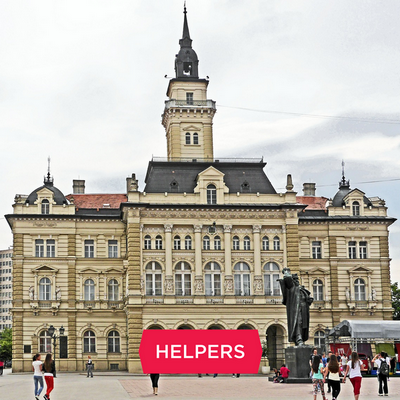Public holidays in Serbia in 2024

If you are managing a business in Serbia, it is important to be aware of the public holidays. On such days, employees might not be required to work, or they should receive extra payment for the same task. Moreover, opening hours for certain services may change as well, which can also affect your business.
The Serbian Calendar
While Serbia follows the Gregorian calendar like the majority of the world, most people in Serbia are members of the Serbian Orthodox Church, which still uses the Julian calendar. The Julian calendar is currently 13 days behind the Gregorian, meaning that certain religious holidays are celebrated almost 2 weeks later than in the rest of the Christian world. This difference will come up when determining holidays relevant to practicing Christians.
Public holidays in Serbia
For starters, here is the list of bank holidays in Serbia for 2024, meaning non-working public holidays:
- 1 and 2 January (Monday and Tuesday): New Year’s first days
- 7 January (Sunday): the first day of Orthodox Christmas
- 15 and 16 February (Thursday and Friday): Statehood Days
- 1 and 2 of May (Wednesday and Thursday): Labor Days
- 3 through 6 May (Friday through Monday): Easter according to the Orthodox Church, Good Friday through Easter Monday
- 11 November (Monday): Armistice Day
If a non-religious public holiday falls on a Sunday, the following working day will be changed to a non-working day. In 2024, this will not apply.
In addition, Christian, Jewish, and Muslim employees cannot be required to work on certain religious holidays. These include:
- 29 March and 1 April (Friday and Monday): Good Friday and Easter Monday, for Western Christians
- 10 April (Wednesday, 1 Shawwal): the first day of Eid al-Fitr for Muslims
- 16 June (Sunday, 10 Dhu al-Hijjah): the first day of Eid al-Adha for Muslims
- 11 October (Friday, 10 Tishrei): the first day of Yom Kippur for Jews
- 25 December (Wednesday): Christmas Day for Western Christians
- Slava: for Orthodox Christians, the day of the patron saint of the family, varies case by case
While according to Serbian law employees are not obliged to declare their religious beliefs towards their employers, it is important for employers to know on which days their employees will be absent. This way finalizing the work schedule at your business might require more negotiation that you are used to.
Apart from the above, Serbia observes several working holidays. This means that while businesses are not necessarily closed, more of your employees might want to take the day off or leave earlier. In 2024, these include the following:
- 27 January (Saturday): St. Sava Day (patron saint of Serbian schools)
- 22 April (Monday): Remembrance Day of Holocaust, Genocide, other Fascist Crimes, and Victims of World War II
- 9 May (Thursday): Victory Day (Remembrance of the end of World War II in Europe)
- 28 June (Friday): Vidovdan, or St. Vitus Day (Remembrance of the Battle of Kosovo in 1389)
- 15 September (Tuesday): Day of Serb Unity, Freedom, and the National Flag
- 21 October (Monday): Day of Remembrance of Serbian Victims in the Second World War and the Kragujevac Massacre
Other vacation days for your Serbian employees
Apart from the above public holidays, employees can have at least paid vacation 20 days each year (or more, depending on their age, expertise, and other factors), and they can have extra days for sick leave and family issues (paternity or maternity leave, bereavement leave, wedding leave), and for blood donation. Moreover, wage supplements apply for employees working overtime and on holidays.
Take public holidays into account if you operate a business in Serbia
Public holidays may affect the daily operation of your Serbian business, as it has an impact both on opening hours, scheduling, and wage supplements. Make sure to consult your HR specialist or accountant well in advance to get an overview on how to best manage things at your company.
Helpers offers assistance with business setup and operation in Serbia, including of course help with accounting and payroll administration. Whether you are just starting your business in Serbia or seeking guidance in navigating in the Serbian business landscape, Helpers is your friend.


